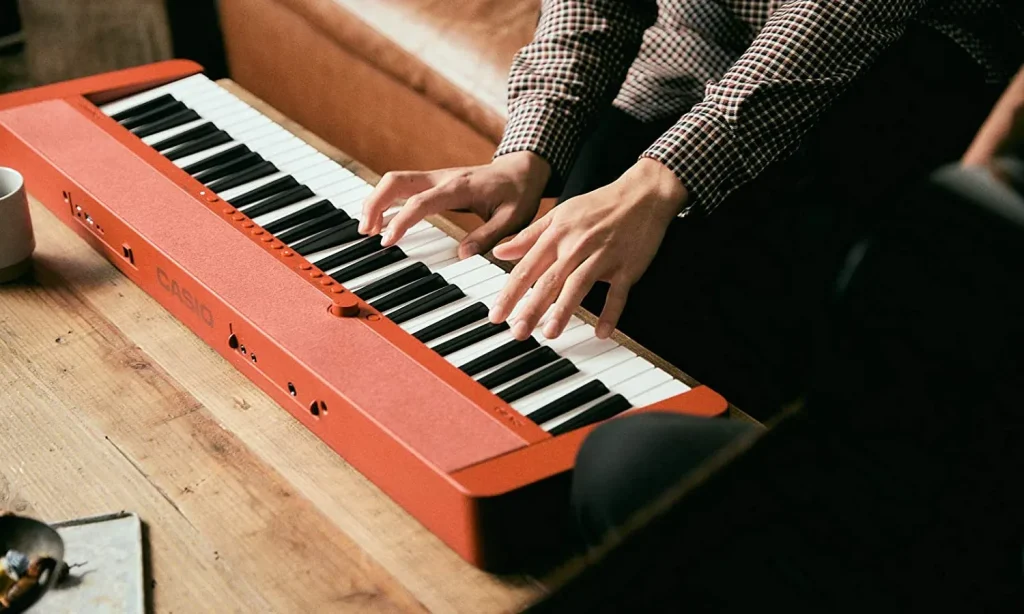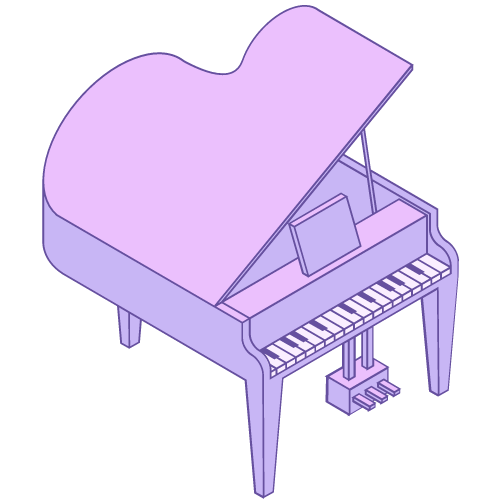Blog
How to Choose the Best Piano for Beginners
Starting your journey on the piano is an exciting and rewarding experience, but one of the first challenges you’ll face is choosing the right instrument. Whether you’re completely new to music or transitioning from another instrument, selecting the best piano for beginners is an essential step. The right piano will make learning easier, more enjoyable, and provide you with the foundation to progress as a musician.
In this guide, we’ll walk you through the key factors to consider when choosing a piano for beginners, so you can make an informed decision that suits your needs, space, and budget.
1. Decide Between an Acoustic and Digital Piano
The first decision you’ll need to make is whether you want an acoustic piano (grand or upright) or a digital piano. Each type has its advantages and disadvantages, especially for beginners.

Acoustic Pianos (Upright and Grand Pianos)
- Sound Quality: Acoustic pianos have rich, organic sound quality produced by real strings and hammers. They provide a more authentic piano experience.
- Touch and Feel: Acoustic pianos offer a traditional weighted key action, which is essential for developing proper finger strength and technique.
- Maintenance: Acoustic pianos require regular tuning, which can be an ongoing cost. They also need more space and can be heavy and cumbersome.
Digital Pianos
- Portability: Digital pianos are lightweight and easy to move, making them great for smaller spaces or those who need to relocate frequently.
- Volume Control: They come with volume controls and headphone options, which is perfect for practicing without disturbing others.
- Features: Many digital pianos offer built-in metronomes, different instrument voices (e.g., strings, organ), and recording functions that can be useful for practice.
- Maintenance: Digital pianos require no tuning and typically have low maintenance costs.
Which Is Best for Beginners?
For most beginners, a digital piano is often the best choice. They are more affordable, portable, and easier to maintain. They also provide a range of features that can enhance your learning experience. However, if you prefer the authentic feel and sound of an acoustic piano, and have the space and budget for it, an upright piano can be a great investment for the long term.
2. Key Features to Look for in a Beginner’s Piano
Regardless of whether you choose an acoustic or digital piano, there are several key features that will make a significant difference in your learning experience.
Weighted Keys
One of the most important features to consider when purchasing a piano is the weighted keys. Weighted keys replicate the feel of an acoustic piano by providing resistance when pressed. This is crucial for developing proper finger strength and playing technique. Look for digital pianos with graded hammer action, which mimics the feel of an acoustic piano, with heavier keys in the lower register and lighter keys in the higher register.
Number of Keys
Most full-sized pianos have 88 keys, but digital pianos may have fewer. For beginners, a piano with 61, 76, or 88 keys can be a good option. If you plan to eventually perform more complex pieces or play in a band, it’s best to get a full 88-key piano, but for casual practice, a smaller keyboard can suffice.
Touch Sensitivity
A touch-sensitive keyboard allows you to vary the volume of the sound depending on how hard or soft you press the keys. This is a critical feature for expressive playing and is especially important if you plan to play classical or jazz music.
Sound Quality
For digital pianos, the sound quality is essential. Look for pianos that use stereo sampling or multi-sampling technology to create a richer, more natural sound. If possible, listen to the piano in person before purchasing or check for sound reviews online.
3. Consider the Space and Portability
The size and portability of the piano are especially important if you have limited space at home or need to move the instrument often.
Acoustic Pianos (Upright and Grand)
- Space: Acoustic pianos, especially grand pianos, take up a lot of space. Make sure you have enough room in your home for the piano and for comfortable playing.
- Weight: Acoustic pianos are heavy and not easy to move, so once they’re placed in a room, they tend to stay there permanently.
Digital Pianos
- Portability: Digital pianos are lightweight and easy to move, which makes them ideal for people who have smaller living spaces or who may need to move the piano occasionally. Some digital pianos are even designed to be portable with removable stands.
- Size: Many digital pianos come in compact sizes, making them ideal for apartments or smaller rooms. You can also find keyboard stands that are adjustable to fit your needs.
4. Budget: How Much Should You Spend on a Beginner’s Piano?
Your budget is one of the most important factors when selecting a piano, especially as a beginner. Both acoustic and digital pianos come in a wide range of prices, so it’s essential to find a model that fits your needs without overspending.
Acoustic Pianos
- Entry-Level: A used upright piano can be a more affordable option, with prices ranging from $1,000 to $3,000. However, you will also need to budget for maintenance costs, such as tuning, and consider whether you have the space for it.
- New Acoustic Pianos: New upright pianos generally start around $3,000 and can go up to $10,000 or more for premium models. Grand pianos are significantly more expensive, starting at around $10,000.
Digital Pianos
- Entry-Level Digital Pianos: You can find good-quality digital pianos for beginners starting at around $300 to $600. These typically come with 61-88 keys, a good sound system, and basic features like touch sensitivity.
- Mid-Range Digital Pianos: For a more premium experience, models in the $600 to $1,200 range will have better sound quality, more features, and better weighted keys.
- High-End Digital Pianos: If you’re looking for a higher-end digital piano, expect to spend between $1,200 and $2,500. These pianos offer superior sound quality, advanced features, and better key actions that closely resemble an acoustic piano.
What’s the Best Budget for Beginners?
If you’re a beginner and just starting out, a digital piano in the $300-$600 range will likely meet your needs. You don’t need to invest in a high-end piano just yet. However, if you have a larger budget and are planning to stick with the piano for the long term, consider investing in a digital piano with superior key action and sound quality for a more rewarding learning experience.
5. Extra Features to Look For
In addition to the essential features mentioned above, there are a few extra features that can make a big difference, especially for beginners.

Headphone Jack
If you plan to practice in a shared space or during late hours, a headphone jack is an invaluable feature. It allows you to practice without disturbing others and provides more focus in your lessons.
Built-In Learning Tools
Some digital pianos come with built-in lessons, exercises, and tutorials that are ideal for beginners. Features like a metronome, recording capabilities, and multiple voices (different instrument sounds) can be incredibly helpful in your practice.
Weighted Keys vs. Non-Weighted Keys
While weighted keys are ideal for developing a traditional piano feel, non-weighted keys (common on some budget models or keyboards) can be easier to play, though they don’t provide the same depth of learning. If you’re purely focusing on learning basic melodies, a non-weighted keyboard could suffice, but for longer-term progress, invest in a weighted key model.
6. Test the Piano Before You Buy
If possible, always test the piano in person before purchasing. Here are a few tips to evaluate the piano:
- Play several notes: Test the response of the keys. Are they sensitive to touch? Do they feel too stiff or too loose?
- Listen to the sound: Does the piano produce a rich, balanced sound? Digital pianos should have clear, resonant tones.
- Check the features: Familiarize yourself with the features, such as built-in learning tools, metronome, and sound effects.
Why It’s Important: Testing the piano ensures that you’re getting a quality instrument that suits your playing style, space, and musical preferences.
Conclusion: Choosing the Best Piano for Beginners
Choosing the right piano for beginners is a personal decision that depends on your needs, preferences, and budget. If you’re looking for an affordable, space-saving, and low-maintenance option, a digital piano is likely your best choice. Look for a model with weighted keys, touch sensitivity, and 88 keys to simulate the feel of an acoustic piano. However, if you have the space and budget for it, an acoustic piano can provide a more traditional, authentic playing experience.
Remember to consider your goals, practice habits, and space before making your purchase. Once you have your piano, consistency and dedication in your practice will lead to significant progress on your musical journey.


